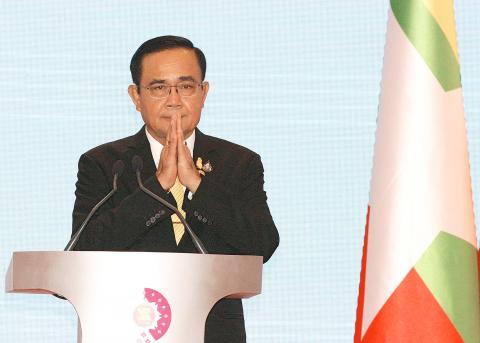Southeast Asian leaders yesterday pressed their call for self-restraint in the disputed South China Sea and renewed their alarm over the US-China trade dispute, with one leader saying it might spiral out of control.
Long-raging territorial conflicts and the protracted trade dispute are high on the agenda in the final two days of meetings of ASEAN leaders.
Facing regional predicaments, such as the Rohingya refugee crisis in Myanmar, the leaders took the stage in Bangkok and clasped their hands together in a trademark ASEAN handshake to project unity.

Photo: EPA-EFE
This year’s host, Thai Prime Minister Prayuth Chan-ocha, opened the summit with a call for regional unity and a push for the bloc to conclude a massive free-trade pact with China and five other Asia-Pacific nations to cushion any impact from the US’ trade conflicts with China.
“The winds of protectionism that are battering the multilateral system remind us that we must hang on ever stronger to one another,” Prayuth said.
The US is not included in the Regional Comprehensive Economic Partnership, which Prayuth said would encompass the world’s largest free-trade region.
Officials from Singapore, Thailand, Indonesia and Vietnam are to be at the G20 summit later this month in Japan, where US President Donald Trump and Chinese President Xi Jinping (習近平) are expected to meet.
“ASEAN hopes there will be discussions that lead to an easing and resolution of these problems, because they affect many countries,” Prayuth said.
Philippine President Rodrigo Duterte on Saturday told other leaders that the trade conflict “is creating uncertainty. It is taking a toll on global growth and it could hinder the ongoing processes of economic integration.”
“The US and China must both take the high road and resolve their differences before the situation spirals out of control,” Duterte said.
In their public communiques, the leaders have avoided naming the US, China or specific nations embroiled in controversial issues in a show of their conservative protocols, but the leaders could raise thorny issues in a closed-door and informal session.
Duterte has said that he would raise the territorial conflicts in the South China Sea following the June 9 ramming of an anchored Philippine boat by a larger Chinese fishing vessel in the disputed Reed Bank (Lile Bank, 禮樂灘).
In a statement outlining their regional policies, the leaders yesterday renewed their call for nations involved in the territorial spats to “exercise self-restraint in the conduct of activities and avoid actions that may further complicate the situation, and pursue the peaceful resolution of disputes in accordance with international law.”
Four ASEAN states — the Philippines, Vietnam, Malaysia and Brunei — along with Taiwan and China are locked in disputes over the strategic waterway.
ASEAN has been in talks with China to negotiate a nonaggression pact called the “code of conduct” to prevent major armed clashes in the region.
Southeast Asian diplomats have told reporters that the first of three rounds of talks on the proposed pact was expected to be completed this year.

INVESTIGATION: The case is the latest instance of a DPP figure being implicated in an espionage network accused of allegedly leaking information to Chinese intelligence Democratic Progressive Party (DPP) member Ho Jen-chieh (何仁傑) was detained and held incommunicado yesterday on suspicion of spying for China during his tenure as assistant to then-minister of foreign affairs Joseph Wu (吳釗燮). The Taipei District Prosecutors’ Office said Ho was implicated during its investigation into alleged spying activities by former Presidential Office consultant Wu Shang-yu (吳尚雨). Prosecutors said there is reason to believe Ho breached the National Security Act (國家安全法) by leaking classified Ministry of Foreign Affairs information to Chinese intelligence. Following interrogation, prosecutors petitioned the Taipei District Court to detain Ho, citing concerns over potential collusion or tampering of evidence. The

‘FORM OF PROTEST’: The German Institute Taipei said it was ‘shocked’ to see Nazi symbolism used in connection with political aims as it condemned the incident Sung Chien-liang (宋建樑), who led efforts to recall Democratic Progressive Party (DPP) Legislator Lee Kun-cheng (李坤城), was released on bail of NT$80,000 yesterday amid an outcry over a Nazi armband he wore to questioning the night before. Sung arrived at the New Taipei City District Prosecutors’ Office for questioning in a recall petition forgery case on Tuesday night wearing a red armband bearing a swastika, carrying a copy of Adolf Hitler’s Mein Kampf and giving a Nazi salute. Sung left the building at 1:15am without the armband and apparently covering the book with a coat. This is a serious international scandal and Chinese

Seventy percent of middle and elementary schools now conduct English classes entirely in English, the Ministry of Education said, as it encourages schools nationwide to adopt this practice Minister of Education (MOE) Cheng Ying-yao (鄭英耀) is scheduled to present a report on the government’s bilingual education policy to the Legislative Yuan’s Education and Culture Committee today. The report would outline strategies aimed at expanding access to education, reducing regional disparities and improving talent cultivation. Implementation of bilingual education policies has varied across local governments, occasionally drawing public criticism. For example, some schools have required teachers of non-English subjects to pass English proficiency

TRADE: The premier pledged safeguards on ‘Made in Taiwan’ labeling, anti-dumping measures and stricter export controls to strengthen its position in trade talks Products labeled “made in Taiwan” must be genuinely made in Taiwan, Premier Cho Jung-tai (卓榮泰) said yesterday, vowing to enforce strict safeguards against “origin laundering” and initiate anti-dumping investigations to prevent China dumping its products in Taiwan. Cho made the remarks in a discussion session with representatives from industries in Kaohsiung. In response to the US government’s recent announcement of “reciprocal” tariffs on its trading partners, President William Lai (賴清德) and Cho last week began a series of consultations with industry leaders nationwide to gather feedback and address concerns. Taiwanese and US officials held a videoconference on Friday evening to discuss the